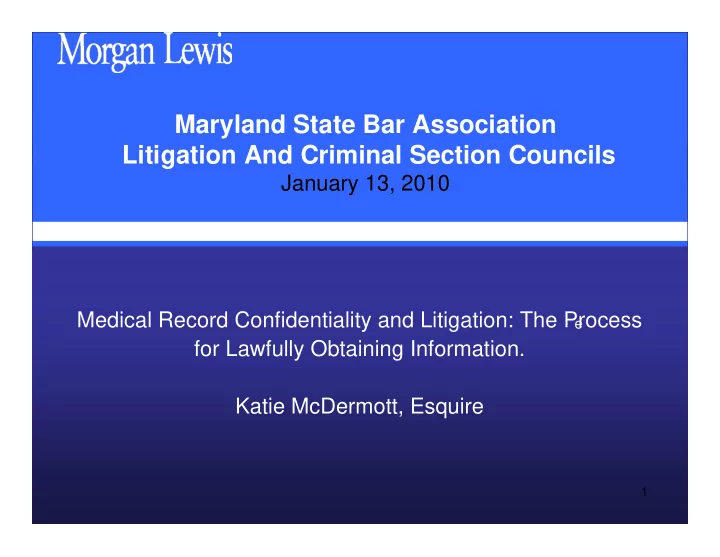

Maryland State Bar Association Litigation And Criminal Section Councils January 13, 2010 Medical Record Confidentiality and Litigation: The Process e for Lawfully Obtaining Information. Katie McDermott, Esquire 1
Basic Principle: Formal Process Keeps Us Safe Medical record privacy is governed by statute and is of constitutional import. HIPAA statute governs unless State provisions are more stringent. HIPAA is a disclosure statute that establishes process for lawful transmission of medical record data via compulsory process. Civil and Criminal litigation and administrative proceedings specially regulated. Criminal investigations pre-indictment specially regulated. No authorization or immunity for informal process. Compulsory process affords greatest protection. -2-
HIPAA and HITECH 2009 updates to HIPAA through the stimulus legislation. HITECH expands reach of HIPAA beyond covered entities and imposes sliding scale penalty structure from negligent to willful conduct. Authorizes State AG enforcement of HIPAA violations and penalty distribution to victims. Attorneys and clients not immune from HIPAA enforcement by HHS OCR or State AG in investigation or litigation proceedings. -3-
State Civil Litigation and Administrative Proceedings HG 4-306 Process Controls. Provide Patient Notice, Subpoena and HG 4-306 to the Patient. Wait 30 days for a response. If a response or objection, seek judicial protective order or resolution via motion to quash process. If no response, send subpoena, 4-306, written assurance letter to record holder. -4-
State Civil Litigation and Administrative Proceedings Letter of assurance must affirm: 30 day notice to patient was provided; there was no response; or any response has been resolved via QPO. If QPO entered, attach to the subpoena. QPO-are not stipulations by counsel. Present QPO to the Court and have judicial officer make privacy determinations and sign order. Compulsory process is a subpoena, summons, warrant, or court order that appears on its face to be lawfully issued. -5-
Federal Civil Judicial and Administrative Process 45 CFR 164.512(e) process controls. Less stringent than State process. Authorizes covered entity to disclose PHI in response to compulsory process or discovery requests. Requires written satisfactory assurances to covered entity of reasonable attempts to provide notice to patients or a QPO. -6-
Federal Civil Judicial and Administrative Process Written satisfactory assurances include representations: attempted notice to last known address of patient or request and nature of litigation proceeding, lapse of time for response or objections, objections resolved, no objections filed, QPO has been agreed to by the parties or requested by the patient. QPO-must contain provisions for prohibiting use of information outside of relevant litigation; and, for destruction of records at conclusion of litigation. No notice or consent required if patient information "de-identified.“ De- identified means that specific information listed in 45 CFR 164.512 is redacted. -7-
Federal Criminal Investigations HIPAA authorizes disclosure of PHI to law enforcement in six (6) circumstances. 45 CFR 164.512(f). Core requirements of relevance and materiality to investigation, cannot de-identify data, request is reasonable in scope. Compulsory process required. Subpoena, Court order, warrant, summons by judicial officer, civil investigative demand. Exceptions for locating suspect, fugitive, material witness or missing person. Covered entity permitted disclosure related to abuse, neglect, domestic violence and aversion of imminent threat to health and safety. -8-
State Criminal Investigations. Begin with Health General Article 4-306(7). Compulsory process assumed, some exceptions for suspected child abuse or vulnerable adult. Disclosure permitted without authorization generally to grand juries, prosecution agencies, law enforcement agencies and their employees; Provided, however, there exist written procedures to protect the confidentiality of information. Prohibits re-disclosure unless authorized by person of interest and other explicit provisions. HG 4-302(d). -9-
State Criminal Proceedings Re-disclosure of records obtained during investigation permissible per AG Opinion. Not a HIPAA issue. Compliance issue with HG 4-306(b)(7). Compulsory Process Authorized by the Court. Md. Rule 4- 264. Trial subpoena to custodian of records under Md. Rule 4- 265. Patient notice not required unless mental health records. HIPAA compliance? Trial and post-trial protective order. Redaction. Medical record confidentiality in court files. -10-
A Few Questions to Ask Assess statutory compliance, constitutional concerns and reasonableness and cost of privacy intrusion. Assess process and substance of request for law, policy and optics. Nature of request-verbal, letter, compulsory process? Status of requestor? Health care oversight, private litigant, law enforcement? Status of record-holder entity? Health care provider? Covered entity? Nature of PHI? Directory information? Does any recognized privilege apply? Mental health or substance records? These records are regulated differently, always. QPO appropriate? May Re-disclosure occur? De-Identification Requirement Workable? Trial proceeding protective orders? Confidentiality of medical record information in court files? Consider QPO at outset of court proceedings to cover medical record confidentiality. Will you and your client have legal cover if you produce the records in response to the particular request? -11-
Quick References Maryland Code, Health General Articles, 4-306: Litigation Process for Obtaining Medical Records. Section 4-307 (mental health records). HIPAA, 45 CFR 164.512: Process for Obtaining Medical Records in judicial, administrative proceedings and law enforcement investigations. Md. Atty Gen. Opinion 94 Op.Att’y 44: State’s Attorneys-Process By Which State's Attorney's Offices May Obtain Medical Records (May 11, 2009). Doe v. Md. Bd. Of Social Work Examiners, 384 Md. 161 (2004)(constitutional right to privacy includes medical record privacy). Law v. Zuckerman, 307 F.Supp. 705 (D.Md. 2004)(HIPAA compliance required for defense communications with plaintiff’s attending physician). Northwestern Mem’l Hospital v. Ashcroft, 362 F.3d 923 (7 th Cir. 2004)(HIPAA subpoena subject to FRCP 45 reasonableness standard). -12-
Contact Information Kathleen McDermott, Esquire Morgan, Lewis & Bockius LLP 1111 Pennsylvania Ave, NW Washington, DC 20004 202-739-5458 kmcdermott@morganlewis.com -13-
Recommend
More recommend